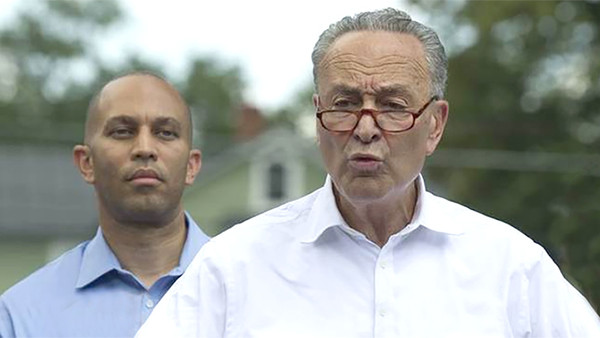By Kevin McCullough
Sure – our military personnel having pay delayed is a serious concern. And yes, some vital programs that feed those in real need being temporarily halted is a legitimate worry. No one should minimize either. But in the larger scheme of things – when the rest of Washington, D.C., shutters its bloated bureaucracies for a few days – the average American is right to ask: what exactly are we losing?
 Ask the obvious question: what’s the downside?
Ask the obvious question: what’s the downside?Turns out, there may even be upsides.
In fact, the longer the government stays closed, the more opportunities the American people have to see what life looks like without thousands of nameless bureaucrats tripping over each other, slowing down progress, and gumming up the works of a nation that functions better when its citizens – not its politicians – are in charge.
One of Donald Trump’s earliest campaign promises was that he would drain the swamp. That phrase became iconic not because it was catchy, but because it was true. The American people had grown sick of seeing a permanent ruling class grow larger, more arrogant, and more detached from their concerns.
Now, in the midst of a shutdown forced by Democrats – Senator Chuck Schumer and Representative Hakeem Jeffries chief among them – the swamp is actually shrinking, even if only by accident.
According to reports, the White House is preparing for imminent federal layoffs. Thousands of jobs at agencies that do little more than perpetuate bureaucracy may be cut loose. In ordinary times, such reforms would require endless hearings, months of wrangling, and a swamp army ready to protect itself. But when the lights go out, things DOGE can do – can be done faster, cleaner, and with far less red tape.
That’s not chaos. That’s clarity.
Imagine waking up tomorrow and realizing that the Department of Education – along with the 4,300 bureaucrats who sit in cubicles pushing paper, writing reports no teacher will ever read, and feeding the beast of the teachers’ unions nationwide – was just gone. Poof. Would America’s children suddenly stop learning math, reading, or science? Of course not. In fact, the federal Department of Education was only created in 1979. Somehow, the United States managed to educate generations of engineers, scientists, business leaders, and entrepreneurs before Jimmy Carter handed the keys to Washington. If the Department of Education were gone, states would still run schools. Local communities would still decide curriculum. Parents would still demand excellence. The only thing missing would be a giant union-backed federal office that has failed our students for decades.
That doesn’t sound like a “downside.” That sounds like a bonus.
Another upside? The public can finally see where loyalties lie.
Vice President JD Vance is already pulling the curtain back, exposing how Democrats are protecting health care benefits for illegal aliens while hard-working Americans see their own premiums skyrocket.
When the government shuts down, Americans suddenly notice what doesn’t shut down.
Social Security checks still arrive. Medicare still operates. Law enforcement still works.
The lights stay on, planes still fly, and commerce continues.
The essentials remain.
What stops, however, are the pet projects and pork-barrel programs that politicians love but taxpayers never asked for. And when that happens, the people begin to ask: why are we funding this in the first place?
Social Security checks still arrive. Medicare still operates. Law enforcement still works.
The lights stay on, planes still fly, and commerce continues.
The essentials remain.
What stops, however, are the pet projects and pork-barrel programs that politicians love but taxpayers never asked for. And when that happens, the people begin to ask: why are we funding this in the first place?
Of course, no one should dismiss the real hardships that come with a shutdown. Our men and women in uniform should never be pawns in Washington’s political games. They deserve certainty, respect, and prompt pay. If anything, this mess should remind Congress that the first duty of government is to protect its citizens, not to bankroll endless social experiments.
But apart from that, most Americans will survive a week – or even a month – without bureaucrats “managing” their lives. In fact, they may even thrive.
The Democrats forced this shutdown hoping to score political points. They thought they could paint Republicans as reckless, extreme, and heartless. But in doing so, they may have handed the American people something far more valuable: a glimpse of what smaller government looks like.
For decades, the conservative case for limited government has been made in theory. Now, Americans get to see it in practice. A leaner, more efficient government doesn’t just save money – it empowers the citizen. It restores freedom. It shrinks the swamp.
So when Schumer and Jeffries, those self-styled “defenders of democracy,” slam the door shut on Washington, maybe they’re doing us a favor. Maybe the Upside Hombres have given America an accidental gift.
In the end, Washington doesn’t produce wealth – it consumes it. It doesn’t create prosperity – it siphons it.
And every day that the swamp is forced into timeout, the American people are reminded that government is best when it is small, efficient, and limited.
So yes – there are real downsides to this shutdown. But there are also undeniable upsides. And for every family that’s tired of seeing their tax dollars wasted on things they don’t want, don’t need, and didn’t ask for – the upsides may just outweigh the rest.
Thanks, Senator Muchacho Schumer. Gracias, Congress-hombre Jeffries.
Yo quiero winning.
 Kevin McCullough (@KMCRadio) breaks news as it happens on New York's Salem Media 570/970AM Radio. Nationally syndicated, he produces broadcast/podcast content airing on 1,600+ outlets, seven days per week.
Kevin McCullough (@KMCRadio) breaks news as it happens on New York's Salem Media 570/970AM Radio. Nationally syndicated, he produces broadcast/podcast content airing on 1,600+ outlets, seven days per week. 























